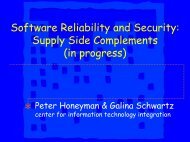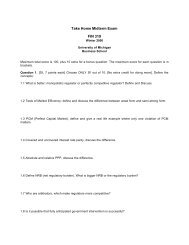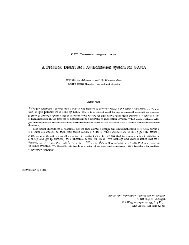Design and Linux Server Implementation Experiences
Design and Linux Server Implementation Experiences
Design and Linux Server Implementation Experiences
Create successful ePaper yourself
Turn your PDF publications into a flip-book with our unique Google optimized e-Paper software.
Sessions Overview✽Correctness✽✽✽✽Exactly Once SemanticsExplicit negotiation of bounds✽Clients make best use of available resources1 client, many sessions✽✽/usr/bin (read only, no cache, many small requests)/home (read/write, cache, fewer, larger requests)Client-initiated back channel✽✽Eliminates firewall woesCan share connection, no need to keep alive
Example of 4.0 ComplexitySETCLIENTID implementation discussion from RFC 3530The server has previously recorded a confirmed { u, x, c, l, s }record such that v != u, l may or may not equal k, <strong>and</strong> recordedan unconfirmed { w, x, d, m, t } record such that c != d, t != s, mmay or may not equal k, m may or may not equal l, <strong>and</strong> k may ormay not equal l. Whether w == v or w != v makes no difference.The server simply removes the unconfirmed { w, x, d, m, t }record <strong>and</strong> replaces it with an unconfirmed { v, x, e, k, r }record, such that e != d, e != c, r != t, r != s.The server returns { e, r }.The server awaits confirmation of { e, k } viaSETCLIENTID_CONFIRM { e, r }.
Sessions Overview (continued)✽✽Simplicity✽✽CREATECLIENTID, CREATESESSION✽Eliminate callback informationDuplicate Request Cache✽✽✽Explicit part of protocolNew metadata eases implementation; RPC independentSee implementation discussionSupport for RDMA✽✽✽Reduce CPU overheadIncrease throughputSee NFS/RDMA talks for more
Draft Issues✽✽✽False Starts✽✽Channels & Client/Session RelationshipChainingOpen Issues✽✽Lifetime of client stateManagement of RDMA-specific parametersFuture Directions✽✽“Smarter” clients & serversBack channel implementation
Channels✽✽✽Originally, sessionid ⋲ clientid;1 session, many channelsDirect correspondence to transport instance✽✽Back & operations channels are similarSame BINDCHANNEL operationProtocol Layering Violation✽✽✽ULP should be insulated from transportKiller use case: <strong>Linux</strong> RPC auto-reconnectsLesson: layering violations & LLP assumptions
Channels (continued)✽ Now clientid:sessionid is 1:N✽✽✽✽Per-channel control replaced by per-sessionSessions can be accessed by any connection✽Facilitates trunking, failoverNo layering violations on forward channelBack channel still bound to transport✽✽✽Only way to achieve client-initiated channelLayering violation, not required featureNot yet implemented, possibly more to learn
Chaining ExampleNFS v4.0Allows COMPOUND procedures to contain anarbitrary number of operationsNFS v4.1 SessionsSince the maximum size of a COMPOUND is negotiated,arbitrarily large compounds are not allowed. InsteadCOMPOUNDS are “chained” together to preserve stateCOMPOUNDOPERATION 1OPERATION kCOMPOUND 1CHAIN: BEGINOPERATION 1OPERATION iCOMPOUND mCHAIN: CONTINUEOPERATION i + 1OPERATION jCOMPOUND nCHAIN: ENDOPERATION j + 1OPERATION k
Chaining✽✽✽Max request size limits COMPOUND✽✽4.0 places no limit on size or # of operationsFile h<strong>and</strong>les live in COMPOUND scopeOriginally sessions proposed chaining facility✽✽Preserve COMPOUND scope across requestsChain flags in SEQUENCEChaining eliminated✽✽✽✽Ordering issues across connections problematicAnnoying to implement <strong>and</strong> of dubious valueLarge COMPOUNDS on 4.0 get errors anywaySessions can still be tailored for large COMPOUNDS
<strong>Implementation</strong> Challenges✽✽✽✽✽Constantly changing specification✽✽Problem for me, but not for youTime implementing dead-end conceptsFast pace of <strong>Linux</strong> kernel development✽Difficulty merging changes from 4.0 developmentLack of packet analysis toolsSEQUENCE operation✽✽Unlike other v4 operationsRequires somewhat special h<strong>and</strong>lingDuplicate Request Cache
Duplicate Request Cache✽ No real DRC in 4.0; Compare to v3.0(on <strong>Linux</strong>)✽✽✽Global scope✽✽All client replies saved in same poolUnfair to less busy clientsSmall✽✽Unlikely to retain replies long enoughNo strong semantics govern cache evictionGeneral DRC Problems✽✽Nonst<strong>and</strong>ard <strong>and</strong> undocumentedDifficult to identify replay with IP & XID
4.1 Sessions Cache Principles✽✽✽✽✽✽✽✽✽Actual part of the protocolClients can depend on behaviorIncreases reliability <strong>and</strong> interoperabilityReplies cached at session scopeMaximum number of concurrent requests &maximum sizes negotiatedCache access <strong>and</strong> entry retirementReplays unambiguously identifiedNew identifiers obviate caching of request dataEntries retained until explicit client overwrite
DRC Initial <strong>Design</strong>✽✽✽Statically allocated buffers based on limitsnegotiated at session creationHow to save reply?✽✽Tried to provide own buffers to RPC, no can doStart simple, copy reply before sendingKiller problem: can’t predict response size✽✽✽If reply is too large, it can’t be saved in cacheMust not do non-idempotent non-cacheable opsOperations with unbounded reply size: GETATTR,LOCK, OPEN…
DRC Redesign✽✽✽No statically allocated reply buffersAdd reference to XDR reply pages✽✽✽✽Tiny cache footprintNo copies, modest increase in memory usageLayering? This is just one implementation;<strong>Linux</strong> RPC is inexorably linked to NFS anyway1 pernicious bug: RPC status pointerLarge non-idempotent replies still a problem✽✽Truly hard to solve, given current operationsIn practice, not a problem at all (rsize,wsize)
DRC StructuresSession Statestruct nfs4_session {/* other fields omitted */u32 se_maxreqsize;u32 se_maxrespsize;u32 se_maxreqs;struct nfs4_cache_entry *se_drc;};SEQUENCE Argumentsstruct nfsd4_sequence {sessionid_t se_sessionid;u32 se_sequenceid;u32 se_slotid;};Slot IDSequence IDStatusXDR Reply011complete0xBEEFBE101286in-progress0xDECAFBADmaxreqs - 10available0x00000000
DRC Fringe Benefit✽✽4.0 Bug: Operations that generate upcalls✽✽✽Execution is deferred & revisited (pseudo-drop)Partial reply state not savedNon-idempotent operations may be repeatedSessions Solution✽When execution is deferred retain state in DRC✽ Only additions are file h<strong>and</strong>les & operation #✽Revisit triggers DRC hit, execution resumes
DRC Future✽✽✽Refinement, stress testingCompare performance to v3Quantify benefits over stateful operationcaching in 4.0✽ Backport to v4.0✽✽✽No session scope, will use client scopeNo unique identifiers, must use IP, port & XIDMore work, but significant benefit over v3
<strong>Implementation</strong> Delights✽✽Draft changes made for better code✽✽DRC & RPC uncoupledSETCLIENTID & SETCLIENTID_CONFIRMRelatively little code✽✽✽✽CREATECLIENTIDCREATESESSIONDESTROYSESSIONSEQUENCE (Duplicate Request Cache)
Conclusions✽✽✽Basic sessions additions are positive✽✽Reasonable to implementDefinite improvements: correctness, simplicityLayering violations✽✽Avoid in protocolCan be leveraged in implementationFurther additions require moreinvestigation✽✽Back channelRDMA
Questions & Other Issues✽✽✽Open Issues✽✽Lifetime of client stateManagement of RDMA-specific parametersFuture Directions✽✽“Smarter” clients & serversBack channel implementationRDMA/Sessions Draft✽✽Under NFSv4 Drafts at IETF sitehttp://ietf.org/internet-drafts/draft-ietf-nfsv4-sess-01.txt








![Power Point Slides in [PDF] - Citi - University of Michigan](https://img.yumpu.com/36279069/1/190x146/power-point-slides-in-pdf-citi-university-of-michigan.jpg?quality=85)
